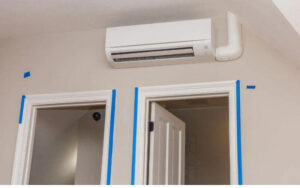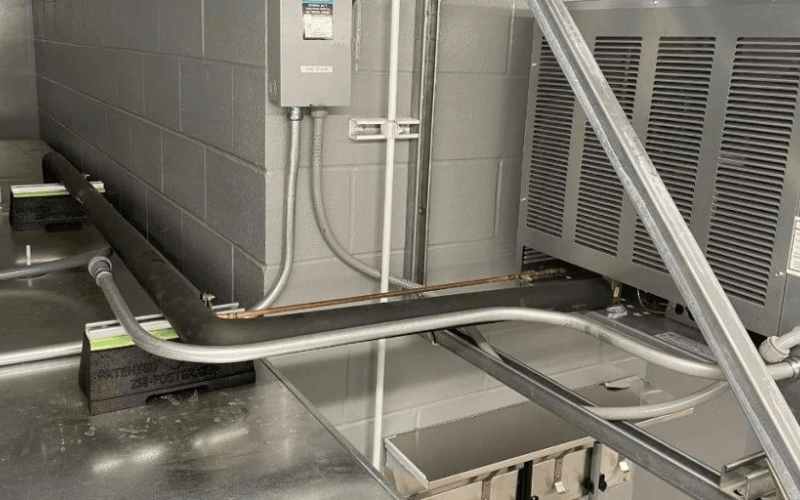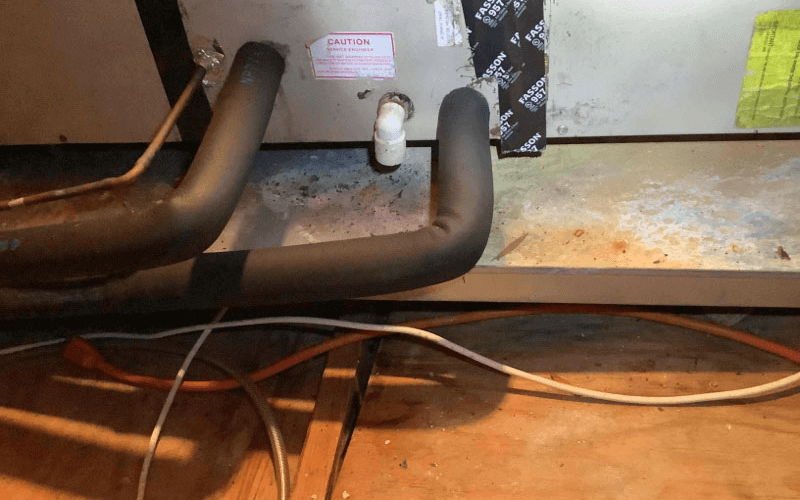Your family and safety are always top priorities. The safest place for your loved ones to be is at home. Ceiling fans are probably at the top of your list if you’re looking for a cheap way to cool your house. Energy-saving ceiling fans can also make a room look more elegant. However, are our ceiling fans safe? Can the ceiling fan catch fire? For you, we conducted some research and gathered some excellent data.
Even now, electrical equipment includes ceiling fans. Therefore, if you make a wiring error, fire is always a possibility. Regular maintenance and inspection can reduce the risk of fire. It almost eliminates the case of a small fire.
Now that we know, we can safely assume that the ceiling fan won’t burn. Discover what scenarios can result in a mishap by reading on. I have additional queries. For more information, scroll down.
Table of Contents
ToggleWhat Is The Probability Of A Ceiling Fan Fire?
You might be thinking Do ceiling fans cause fires? According to reports, ceiling fans are responsible for 3 to 6 percent of house fires. They make an easy scapegoat for house fires. The ceiling fan exposes it to more direct flames, which can cause severe burns.
Typically, fire inspectors or insurance officials receive a brief explanation of the cause of the fire from absolute damage. When a fire starts under the fan, the flames travel through a hole in the drywall where the fan’s electrical system is located. It burns the ceiling joists, and the inspector determines that the fan overheated, but this is not always the case.
Despite this potential error in diagnosing home fires, the number of ceiling fans blamed for home fires is still small.
| Image | Product | Features | Price |
|
Best Seller

|
Socket Fan Light Original – Warm Light Ceiling Fans with Lights and Remote |
with Light Replacement for Light Bulb/Ceiling Fan for Bedroom, Kitchen, |
$45.00
|
|
Best Seller
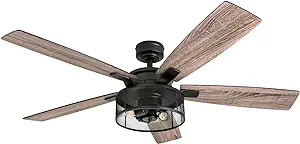
|
Honeywell Ceiling Fans Carnegie, 52 Inch Industrial Style Indoor LED Ceiling Fan |
with Light, Remote Control, Dual Mounting Options, 5 Dual Finish Blades, |
$111.60 |
|
Best Seller

|
Hunter Fan Dempsey Low Profile Indoor Ceiling Fan |
with LED Light and Remote Control, Metal, Fresh White, 44 Inch |
$134.99 |
|
Best Seller
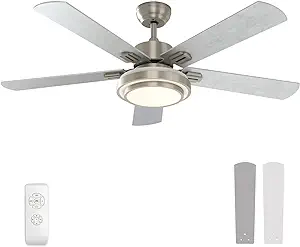
|
warmiplanet Ceiling Fan with Lights Remote Control |
Fan with Lights Remote Control, 52 Inch, Brushed Nickel (5-Blades) |
$139.99 |
|
Best Seller

|
VONLUCE Ceiling Fans with Lights, 52 Inch Modern Ceiling Fan and Remote |
6 Speed Reversible Quiet DC Motor, Ceiling Fan for Bedroom Patio, Indoor & Outdoor, Black |
$119.99
|
What Causes Ceiling Fan Fires?
The most apparent cause of a ceiling fan catching fire is faulty electrical wiring. Setting up the ceiling fan wiring can be difficult, especially with no fan wiring. Ceiling fans frequently have lights, which complicates installation. If this is not done correctly, the wiring may spark and ignite. Adding improper wiring to improper installation is more of a concern than a fire.
The buildup of dust and debris is another factor contributing to the fire. If the debris is substantial enough, it may obstruct the vents of the ceiling fan, heat up, and catch fire. Keep in mind that the ceiling fan is fixed there. A Gypsum board with wooden beams makes up the ceiling. All these materials are flammable.
Also check: Concerned about Air Quality: Choose the Best air purifiers.
How To Avoid A Fire Caused By A Ceiling Fan:
The best way to prevent a ceiling fan fire is through proper installation. Hiring a qualified electrician to wire and install the fan is the best way to get it done right. It is not a DIY job unless you are adequately trained to deal with electricity. It’s best to delegate this task to a professional!
You are free to select the ceiling fan of your choice. Leaving the complicated parts to the contractor means you are only left to worry about the ceiling fan’s appearance.
To avoid a fire, ensure the ceiling fan blades and vents are properly cleaned after the installation. You’ve probably noticed how dust accumulates on the fan blades. This accumulation also happens around the fan vents. Check for dirt regularly to ensure that it is breathable. Microfiber dusters with extension poles are ideal for keeping your ceiling fan clean.
How Common Is An Electric Fire?
According to the National Fire Protection Association, electric fires are the second leading cause of home fires, accounting for approximately 13% of all home fires.
Arc discharge and sparks can be caused by improper electrical equipment and wiring installation. The majority of these issues arise during the winter when people are more likely to use devices with heat sources. Electricity and fire are inextricably linked and should be treated with caution. Ensure that all outlets and wired devices are adequately treated and installed.
Is It Possible For The Fans To Catch Fire If They Run Overnight?
Running a fan all night can start a fire, but so can leaving the fan on all day. Allowing the device to run for extended periods can cause it to overheat and catch fire.
The danger comes from the fire that starts while you’re sleeping. Your response to the fire may be significantly delayed or nonresponsive when you go to bed. Smoke inhalation is one of the leading causes of death in fires. You risk losing consciousness if you inhale enough smoke before waking up while the house is on fire.
As a result, turning off all devices before bed is the best way to ensure your and your family’s safety.
Why is the ceiling fan smelling like it’s on fire?
Suppose the ceiling fan emits a burning odor while operating. In that case, it could be due to faulty wiring or overheating of the motor. The burnt smell should not be overlooked. Do not use a ceiling fan that has a burning odor. Check that the fan is clean and that the burning odor is not caused by dust clogging the engine. If the smell persists, contact an electrician to have the wiring checked. Don’t underestimate these issues; deal with them as soon as possible.
Tips for Ensuring Ceiling Fan Safety
Follow these guidelines to reduce any potential fire threat linked to ceiling fans:
Installation By A Professional
A qualified electrician should always install ceiling fans in accordance with the manufacturer’s instructions.
Schedule Maintenance
Check for wear, tear, or loose wire symptoms during routine maintenance. Replace broken parts as soon as possible.
Use Recommendation Bulbs
To avoid overheating, if your ceiling fan has lights, use the recommended wattage and kind of bulbs.
Circuit Overloading Should Be Avoided
Keep an eye on the amount of electrical devices connected to a circuit, especially if many fans or other appliances are being used.
Maintain Fans Clean
Dust and debris can build up on the fan blades and motor, potentially causing them to overheat. To avoid this, keep your ceiling fan clean on a regular basis.
Also, check: Can You Put A Ceiling Fan On A Vaulted Ceiling?
Conclusion:
A ceiling fan is an electrical device installed in a ceiling hole. Ceiling fans can catch fire in these conditions. Check that the ceiling fan is installed correctly and cleaned. Regular fan maintenance allows you to enjoy the cool breeze for many years.
FAQ
Why does my ceiling fan smell like it’s burning?
The burning smell indicates an overheated object. Before you look further into the matter, the fan motor and other components need to cool down. Additionally, you should refrain from inhaling additional paint or plastic fumes that may be burning. Switch off the fan and depart for a while.
Is it normal for a ceiling fan to get hot?
Fans do indeed get warm. It’s because they operate on the most widely used type of motor—AC motors. Anytime these motors are in use, they heat up. Heat is dispersed into the room through the fan housing as the ceiling fan operates.
Can a ceiling fan cause a house fire?
Fans can also present a fire risk if they are not used properly. Improper electrical wiring contributes to more than 1,000 residential fires annually. 3-6% of home fires appear to be started by ceiling fans, and they occasionally serve as convenient scapegoats for house fires.



